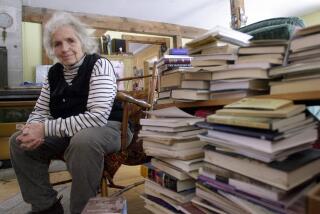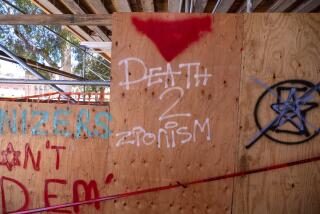RELIGION / JOHN DART : Scholars Seek Substitute for the Word ‘Holocaust’
The systematic Nazi massacre of 6 million Jews during World War II was a crime as horrific as they come, a historic flowering of evil that still sends shock waves through the human race and inspires books, research and movies like “Schindler’s List.”
But what to call it?
Since historian Elie Wiesel popularized the usage, Holocaust has been the most commonly used term.
But now a small number of scholars and religious leaders are seeking a substitute, objecting to Holocaust on a number of grounds. Whether they can swing this change in the established language remains to be seen, but the debate raises worthwhile questions.
Some Jews feel that because holocaust has been applied to other actual or potential instances of genocide, such as the killings of Armenians by Turks and the expression “nuclear holocaust,” it has lost its special application to Jews and the Jewish experience.
Moreover, other Jewish scholars, notably Zev Garber, chairman of Jewish studies at Los Angeles Valley College, have objected to Holocaust because the original, literal meaning of the term was a reference to burnt offerings in ritual sacrifices, such as those described in the older part of the Bible.
If this religious meaning is retained, in a horrific distortion, “it makes the 6 million Jews an offering to God, and the priests are the Nazis,” Garber said in an interview.
Garber says he has partially influenced Wiesel--a Nobel prize-winning author, poet and survivor of Auschwitz and Buchenwald--to substitute other words in recent years.
*
Garber prefers Shoah . The Hebrew word means “destruction, catastrophe, devastation”--as in the Yom Ha Shoah (Day of Destruction) observances that were held Thursday or Friday night at some synagogues. The holiday is also written Yom Hashoah .
“What is important for me is that it is not loaded with theological overtones,” Garber said. “Language determines how we think. And because Shoah is a Hebrew term, we don’t lose the Jewishness of the victims.”
The term has won some converts.
Pope John Paul II and the Vatican have used Shoah routinely in that context. In announcing that the Pope and Jewish leaders would attend a concert Thursday marking the day, the Vatican statement said: “The Shoah is a monstrous abyss from which . . . the darkness of human evil was realized in all of its terrifying depth.”
Last month, the co-producer of “Schindler’s List,” death camp survivor Branko Lustig, used both words-- Holocaust and Shoah --when accepting the Oscar for best picture with Steven Spielberg.
Nevertheless, others believe Shoah can be used only sparingly.
In Burbank on Tuesday night, the word Shoah may only occasionally be uttered during the community-wide Days of Remembrance program at First Presbyterian Church that will feature Holocaust concentration camp survivors and liberators, said Sylvia Sutton of the sponsoring Burbank Human Relations Council.
“We try to reach the non-Jewish community and most of our participants are Christian churches,” Sutton said. “We call our committee the Yom Hashoah Committee, but when we say it is a Holocaust commemoration program, that immediately tells them what it’s about.”
Likewise, Rabbi Harold Schulweis said that he believes that 90% of Jewish people would not recognize the word Shoah .
“In terms of popular usage, I think it’s a little late to substitute for the word Holocaust ,” said Schulweis, senior rabbi at Valley Beth Shalom in Encino.
“I’m not of the school that thinks it’s wrong to share the word, such as describing the Armenian massacre early this century,” Schulweis said.
Garber raised the issue of the sacrificial-religious roots of the word holocaust in a paper he co-authored in 1988 with USC’s Bruce Zuckerman for a Holocaust conference at Oxford University.
The paper noted that Wiesel had a religious analogy in mind in employing the word holocaust, comparing Nazi murders of Jews to the biblical story of Abraham’s near-sacrifice of his son, Garber said.
In the Bible, Abraham received a message from God to make a sacrifice--not of an animal, as was customary, but of his beloved Isaac. The grief-stricken Abraham made preparations to do so, but was halted at the last moment, as he raised the knife, by an angel of God saying that the instruction was a test of Abraham’s obedience and devotion.
Isaac, the seed of the Jewish race, was thus the silent, blameless victim of circumstances and the first survivor in Jewish history.
“Wiesel had written to me earlier, explaining that he chose Holocaust because ‘we needed a word to capture the fire, to capture the sacrifice,’ ” Garber said.
At a reception following the session on the Garber-Zuckerman study of the word’s roots, Wiesel congratulated him, Garber said.
Wiesel now tends to refer to the genocide as Shoah , or as the Great Catastrophe, or as Churban , a Hebrew word used within classical Judaism, Garber said. The word is associated with the destruction of the Jerusalem Temples.
“Speaking as an Orthodox Jew,” Garber said, “ Churban implies a divine wake-up call that was brought about by Jewish sins, that somehow Jews brought about their own demise, which is a meaning unacceptable when applied to the World War II events.”
*
In an upcoming book, Garber concedes that even Shoah has an intellectual limitation. “The phrase does not perfectly describe Nazi Germany’s agenda for the Jews: Genocide.”
But if “Judeocide” were adopted, Garber said, it would not include “Hitler’s wish for the total annihilation of Judaism” and of Jewish culture as well as the Jewish people.
Perhaps Garber has the last word in his forthcoming book “Shoah: The Paradigmatic Genocide,” to be published by University Press of America:
“No term of record . . . captures the full metahistorical and historical impact of the senseless murder of millions.”
More to Read
Sign up for Essential California
The most important California stories and recommendations in your inbox every morning.
You may occasionally receive promotional content from the Los Angeles Times.










